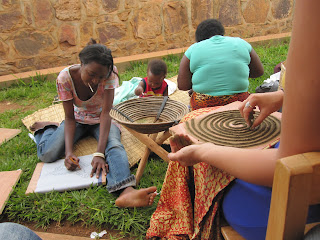But only the words. Not the faces. Not the laughing. Not the babies. Not the walking. Not the eyes. Not the hugs. Not the hands.
Not the women. Je comprends les femmes.
There are three languages circulating. Kinyarwanda. French. English. I speak English quite well. I speak French like a 5th grader. I speak Kinyarwanda if you consider "How are you?" "I'm good" and "Thank you" conquering a language.
But the women. There's something about being a woman.
A woman I will call Grace said it best. Grace came to our home last week to share her testimony. Her face was soft, open -- she seemed to be younger than me. But she was 26 in 1994, and she experienced an incomprehensible hell. We sat on the black leather couches and she told us about it. We were stone.
She was saved by a Hutu who kept her in his home and then went next door to kill. (That is one thing I will never understand about genocide. How can you justify to yourself saving one and then killing others? Why did you save that one? Why did you kill the others?) From the moment she was spared by this man, she narrowly escaped road blocks and murder. Her path led her to safety, to safety, to safety and then to rape, mutilation, pregnancy and HIV.
When Grace was in our living room, telling us about the mutilation, she asked if she could show us. We were stone. She stood up and the leather chair squealed. She untied the strings of her wraparound skirt and lifted her shirt to show the scars. I do not want to tell you about the scars. Just think about what they did to her. I will tell you again: Rape. HIV. Pregnancy from the rape. These scars.
But, she was graceful and digested our sorrowed faces. She explained herself:
"Frankly," she said, "I showed you my scars because you are women. There is a strength and a power that is innate within women that men do not have, and it gives us the will to survive. That is why I can show you my scars."
Je comprends les femmes.
Yesterday was my first day with les femmes d'Avenir. I am Emmeliene's assistant (she is the resilient and inspirational counselor at Avenir whom I blogged about on June 5), and although we do not speak the same language, we giggle at the same times and she knows how to say "We are together" in English. I should learn the equivalent in Kinyarwanda. She encourages me to speak French, our mutual language, even when I say things like, "To go, I would like." As I said, we giggle at the same times.
I met the AGATAKO women yesterday. The AGATAKO are those who make the traditional art. They sit on the stoops of the Avenir cooperative together, talking about the neighborhood, joking, calling each other bossy, as they roll tiny snake pieces of mixed tree ash and cow poop together and follow the chalk lines on the wooden board. They are making Ingubo -- "shield" -- Amatama -- "well-designed" -- and Impalage -- "zebra" -- to sell at the cooperative. They welcomed me immediately, and we all talked -- me, Emmanuel and the women. I told them I wanted to make the art, too. They told me I was one of them now. And they pulled me on to the stoop.
"No!" They'd insisted at first after I'd asked to make the art. "We don't want your hands to smell like poop!"
I know they had just met me, but they obviously didn't know me very well. Because poop-smelling hands is no problem for me, especially when it means I am apart of their art. They sat close to me and showed me how to manipulate the clay-like poop substance. They showed me how to spit on my fingers to keep the substance moist and when we all ran out of spit, Emmanuel went to the store to buy suckers.
This particular piece of traditional artwork has a meaning, and in fact, it is the piece I was attracted to and bought the first time I visited Avenir. It is painted with black and white and represents a person's life; it shows how life begins and how it continues. I look at it and feel dizzy and uncertain and comforted and inspired all at once; such is life.
Lost in translation.
But not this. This experience needs no translation. I am a woman. You are a woman. I understand you.
Yanna









No comments:
Post a Comment